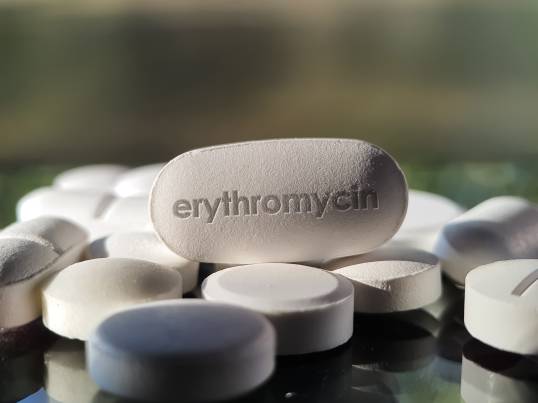Connect with a verified veterinarian in minutes. Licensed vets are available 24/7 to answer your questions. No need to worry about your furry family member.
Erythromycin is a commonly used medication for humans. And with the number of pet parents using erythromycin, it’s no wonder that more dogs are also gaining access to this medicine! But what happens if a dog eats erythromycin?
Has your dog eaten erythromycin? Are you worried that erythromycin will make your dog sick? If so, you’ve come to the right place. We understand it can be scary when your dog eats something like this.
We’ve put together some information about erythromycin and whether it can make a dog sick. Let’s get started!
What is Erythromycin?
Erythromycin is an antibiotic used to treat a wide range of bacterial infections. The medication works to kill bacteria. This prescription medicine is used in both humans and dogs.
This antibiotic is used to treat skin, bone, and sinus infections in dogs. It’s also used to treat Lyme disease.
While dogs and humans can safely take erythromycin, what happens if a dog eats a dose meant for humans?
Erythromycin & Dogs
It is possible for a dog to get sick if he eats too much erythromycin. The usual canine dose is about 5 to 10 mg every eight to twelve hours. If your fur baby has more medication than this, erythromycin can be toxic for him.

Review symptoms, medications & behavior to keep your pets healthy with a Vet Online in just minutes.
Ask a Vet Live NowSymptoms of Erythromycin Ingestion in Dogs
You may notice these symptoms if your dog has eaten erythromycin:
- Excessive drooling
- Lack of appetite
- Vomiting
- Diarrhea
- Drinking or urinating excessively
- Skin lesions
- Tremors
If your dog shows any of these symptoms, call the vet immediately. This is an emergency.
Be sure to let the vet know how much of the medication your dog has eaten. The vet will also need to know about what time this happened.
At the vet’s, they will work to decontaminate your dog’s body by inducing vomiting, using activated charcoal, or other methods. The vet will also treat other symptoms as they arise. Your fur baby may also require an IV for fluids and make it easier to administer medications.
Depending on the severity of the symptoms, your canine companion may need to be hospitalized for one or more days.
The good is that dogs who receive prompt medical treatment have a great chance of making a full recovery.
If your dog has a habit of going after your medications, then be sure to store the meds where your fur baby can’t get them. You’ll both be happier for it!
Connect with a verified veterinarian in minutes. Licensed vets are available 24/7 to answer your questions. No need to worry about your furry family member.

Kyoko
Kyoko is from a family of 3 and moved to New York with her parents and siblings when she was 13. Kyoko is fond of spending a great amount of time with pets, specifically her beagle Luna and cat Missy. Her boyfriend often complains that she spends too much time giving attention to their animals. Kyoko has written dozens of articles concerning pets and is aiming at owning a pet shop one day!
Review symptoms, medications & behavior to keep your pets healthy with a Vet Online in just minutes.
Ask a Vet Live Now





